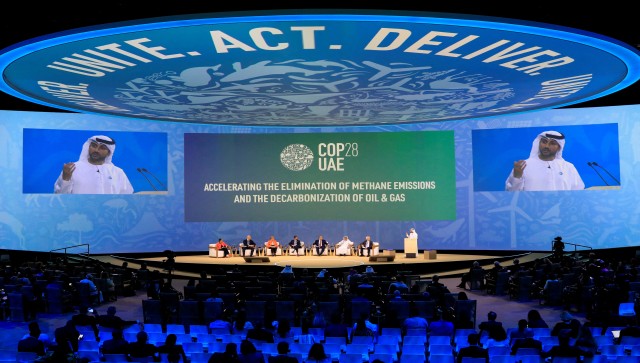The UN climate summit was to end around midday on Tuesday and as usual, it was delayed. This happens every year and the reason for the delay was the same old problem: How do you get around 200 nations to agree on anything? Especially about contentious issues like climate change. So it’s no surprise that nothing meaningful was accomplished. There was no consensus on the final COP28 deal. And the countries were left scrambling at the eleventh hour. Desperately trying to put out some statement. This climate summit saw protests, dramatic statements and dirty politics.
Earlier Tuesday, a young Indian climate activist took to the main stage, she was given a round of applause and then kicked off stage, and she wasn’t the only protester. A bunch of them held hands and inconvenienced some delegates. The entire summit is a hotbed for climate protests. But does it really translate into action?.. “I cannot hide the fact from you that the text, as it now stands, is disappointing,” said European Union’s climate commissioner, Wopke Hoekstra. “Perhaps until we see fire all over the world, until we see wars on our streets everywhere, perhaps we will see it, before we probably get serious, I know that. Climate change is real. Our backyard is burning. The front yard will soon catch on fire,” said Hauwa Umar Mustapha, a climate change advocate from Nigeria. These comments were made after a draft was introduced. A draft COP28 deal shows how divided our world is, it exposes the climate politics at play. The science of climate change is very clear, the way to stop it is to limit the use of fossil fuels. By phasing down or phasing out their use. But the draft doesn’t talk about it. It doesn’t mention the terms like phasing down or phasing out. And this has divided countries. One side wants a draft that talks about phasing out fossil fuels. The other side doesn’t want it. The latter group includes the host nation, the UAE and the oil producing bloc, OPEC. “As you know, [on December 11] we released a text. As you also know, lots of parties felt it did not fully address their concerns. We expected that. In fact, we wanted the text to spark conversations. And that’s what’s happened," said COP28 Director General, Majid al-Suwaidi. It’s meant to spark conversations, he says. But climate change won’t wait for endless conversations and summits, you need action, and you cannot act when you don’t agree on the basics. So, you have oil producing nations on one side, and the West and African nations on the other. Further, some of the biggest objections came from the smallest of places like the island nations that dot the pacific. Countries like Samoa, Niue and the Marshall Islands. These countries are already fighting a losing battle, sea levels are rising, and these nations are drowning, so they want much stronger action against climate change. And this is just one part of the climate divide. The other part is funding. Who will pay for climate action? Who will pay to repair the damage caused by extreme weather? Should it be the victim countries? Or, the rich Western nations that accelerated the climate crisis in the first place. Today the West is raising a hue and cry about fossil fuels. But over the last few centuries, they’re the ones who polluted the planet for their own growth. They are happy to limit fossil fuels now, but not too keen on opening their wallets. The COP28 wants donations into a Climate Action Fund. The fund will pay for a transition to clean energy and finance new green projects. It will also pay poorer nations for the loss and damage they suffer due to climate change. So far, countries have committed over 80 billion dollars to it. That sounds decent. Until you remember that the climate change funding gap is about 4 trillion dollars. So the contribution is a drop in the ocean and there’s still disagreement and acrimony along with a lot of broken promises. “Well, I think what we’ve seen over the last 20 years is that there is a direct correlation between the climate crisis and the movement of people. So, if we wish to help people to stay where they were born and to enjoy and rejoice in the beauty of their land, we have to maintain that land with them and for them. The honest truth is, if we don’t make the Global South livable, people will move because there is a thirst in humans and in humanity, to stay alive,” said Commonwealth Secretary-General, Patricia Scotland. Unfortunately, COP summits don’t fix any of these, and getting 200 odd countries to agree to anything will always be next to impossible. So why have the COP summits at all? Millions were spent organising the event. Also, there is no count of the amount of carbon emissions from people flying in on their private jets to attend the summit. All these for non-binding pledges and statements that have no way to force anyone into action? At this rate, COP summits will be reduced to expensive photo-ops and not a solution to the world’s climate problems. Views expressed in the above piece are personal and solely that of the author. They do not necessarily reflect Firstpost_’s views._ Read all the Latest News , Trending News , Cricket News , Bollywood News , India News and Entertainment News here. Follow us on Facebook , Twitter and Instagram .
)